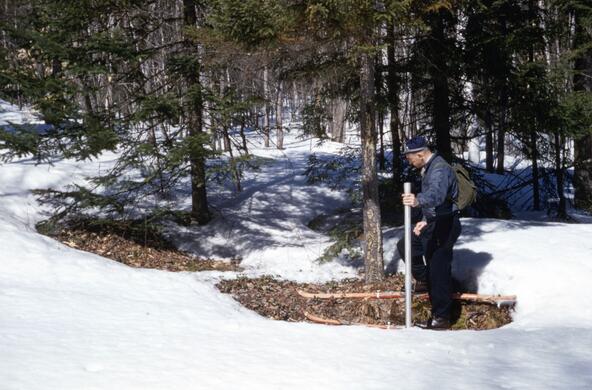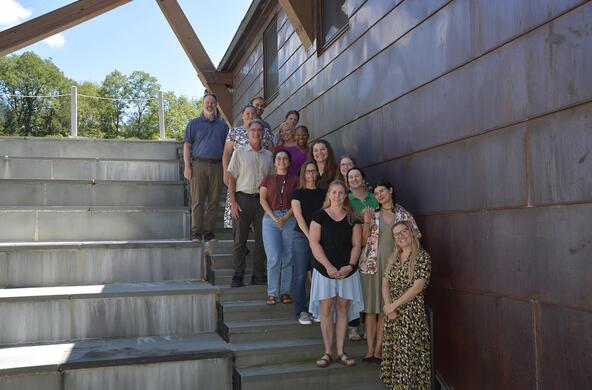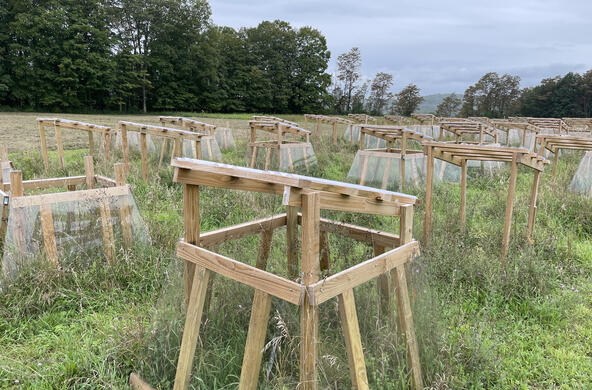You may take the ground under your feet for granted, but a soil researcher at Cary Institute of Ecosystem Studies sees dirt a little differently than most.
Jane Lucas is an ecologist researching threats facing soils, and how they can be understood and managed in the face of global change. She recently appeared at a “Cary Science Conversation” to discuss "the state of soils."
"Soils are the foundation of everything," Lucas said. "I mean, it's literally what we build our lives on. But it's also, 95% of our food comes from our soil ecosystem, soils are responsible for filtering and cleaning most of our water, they keep us healthy, they're a huge carbon store that is often under appreciated."
Lucas – no relation to this reporter – says healthy soils produce the majority of our food supply, buffer extreme weather, and safeguard water resources. They lock away twice the amount of carbon stored in plants and trees and are hotspots for antibiotic discoveries. Yet we are losing fertile soil much faster than it can be replaced.
"One of the biggest things we see that hurts our soil is that we're converting land that used to have, maybe forested systems, into agricultural systems, and in that process, we're getting rid of these deep, long-lasting, heavy rooted trees, that now all of a sudden expose soil to more erosion," said Lucas. "At the same time, we are trying to grow more out of our soils. And so to do that, we have to add more to our soils, things like nutrients, herbicides, pesticides. And while those are really important, because they help us grow food, it's kind of a short-term gain for a long-term consequence, because most of those items actually kill the microbiome. And it's microbes that are kind of gluing themselves together that hold soil in place. And unfortunately, when we add these compounds, or if we come in with, like really heavy machinery and compact our soil, it causes them to be much more susceptible to erosion."
Lucas says that as climate changes, warming temperatures alter precipitation patterns, fostering longer periods of drought.

"Soil really likes to be moist, it likes to be kind of like the, you know, texture of a wrung-out sponge, that's when it's healthiest and happiest," Lucas said. "And as it dries, it becomes more susceptible to erosion, you get these wind storms, and it starts to blow away. And so some of us think about the dustbowl imagery from the past, and think, OK, that's a historic problem. But just two weeks ago, I think, Illinois was dealing with really dry conditions, we didn't have lots of plant cover, because it's early in the cropping season. And we were getting these huge dust storms that cause tons of accidents. So this is a very real problem that's happening currently. And drought is a big part of that."
Closer to home, Amanda Terhune, an Agriculture Program Manager at Cornell Cooperative Extension in Voorheesville, says for the most part, soil in New York’s Capital Region is in good shape.
"There's a lot of great ground here," Terhune said. "It depends on whether the soil has been worked or cared for or depending on what equipment’s gone over it, if it's been compacted. A lot of people use cover crops to prevent erosion. Some people fertilize it. Some people do everything organically. So there's so many different variables to what can be done with the soil around here."
Lucas says it takes nature about 500 years to grow an inch of topsoil. She is heavily involved with "Stressed Out Soils," a large-scale experimental project that the Cary Institute says is the first to look at how drought, warming, fungicides, anti-bacterials, and pesticides interact to shape soil health. Eighty plots have been established on grasslands to serve as a model for similar experiments around the U.S.
"Global climate change is this very interactive process, you know, it's not that we're just gonna get warming temperatures, or just having a drought, right, these things will happen at the same time," Lucas said. "And at the same time, we're also going to be adding things to our soils like herbicides, or pesticides, antibiotics. So the goal of my study is to understand what happens when these different stressors hit our soil at the same time."
Lucas recommends composting as a means of adding nutrients to soil as well as the tried and true tradition of crop rotation along with organic or “Regenerative Agriculture” farming that can reverse climate change by rebuilding organic matter and restoring degraded soil biodiversity.






